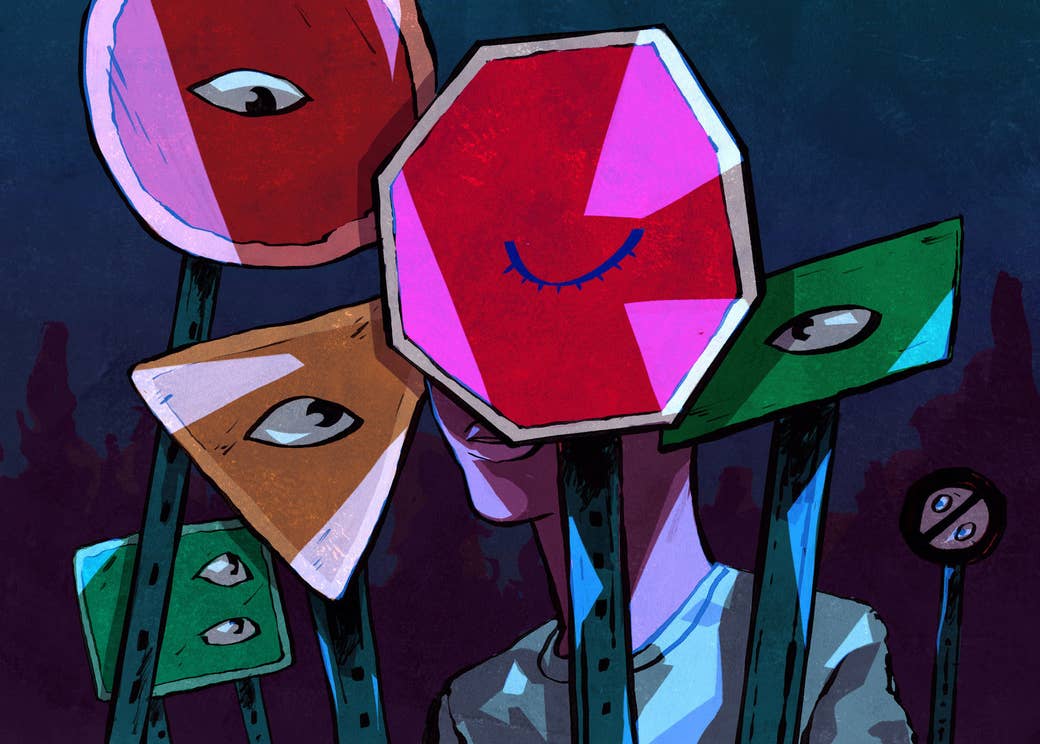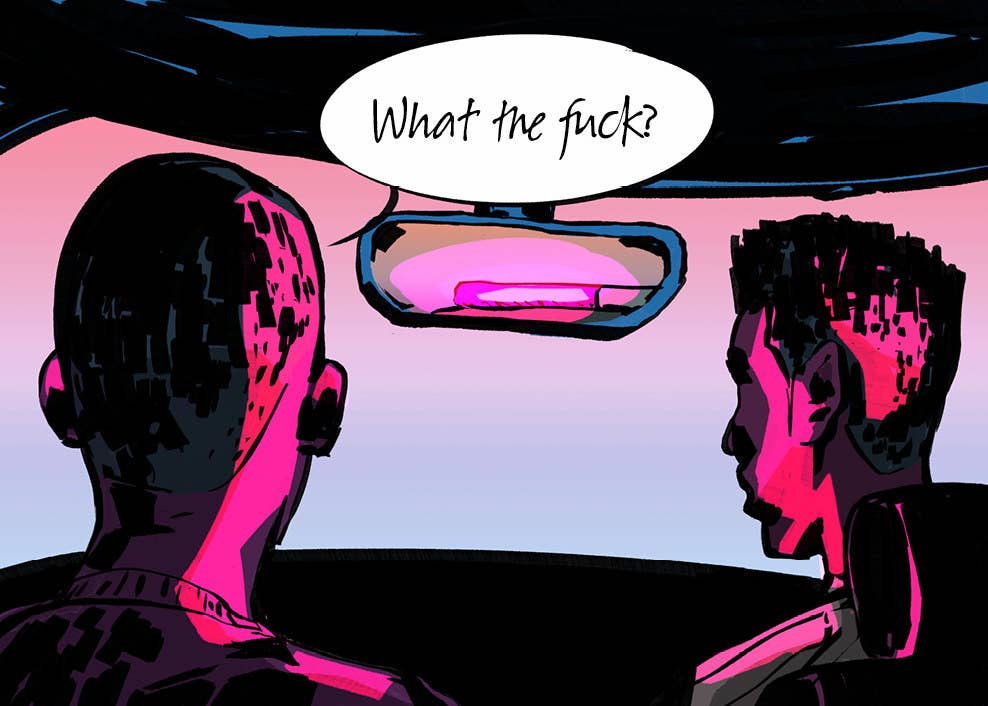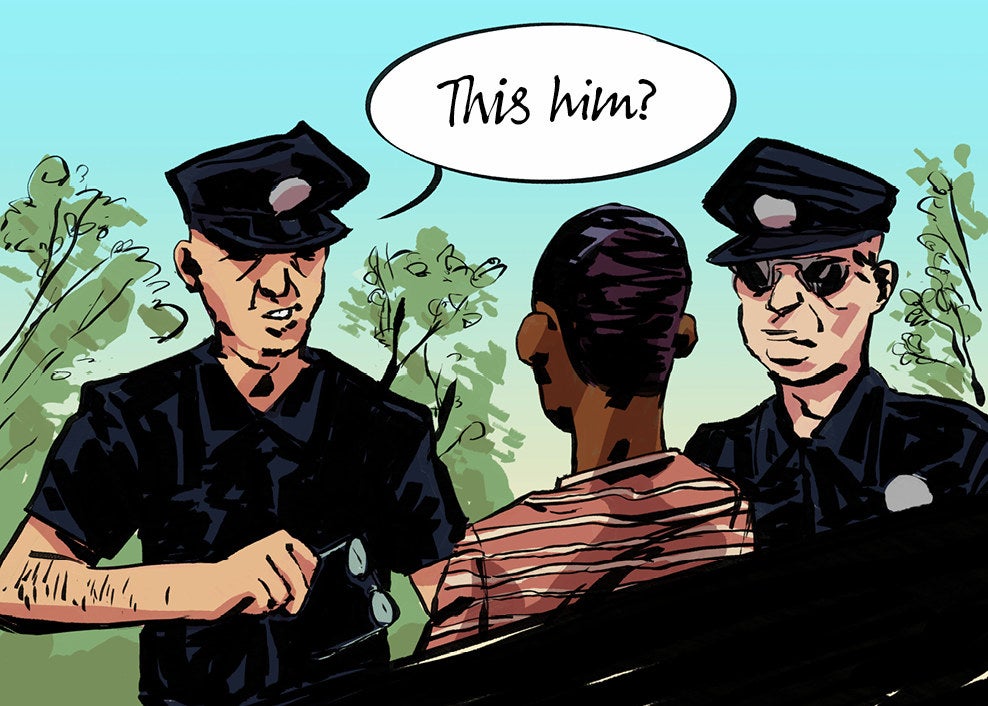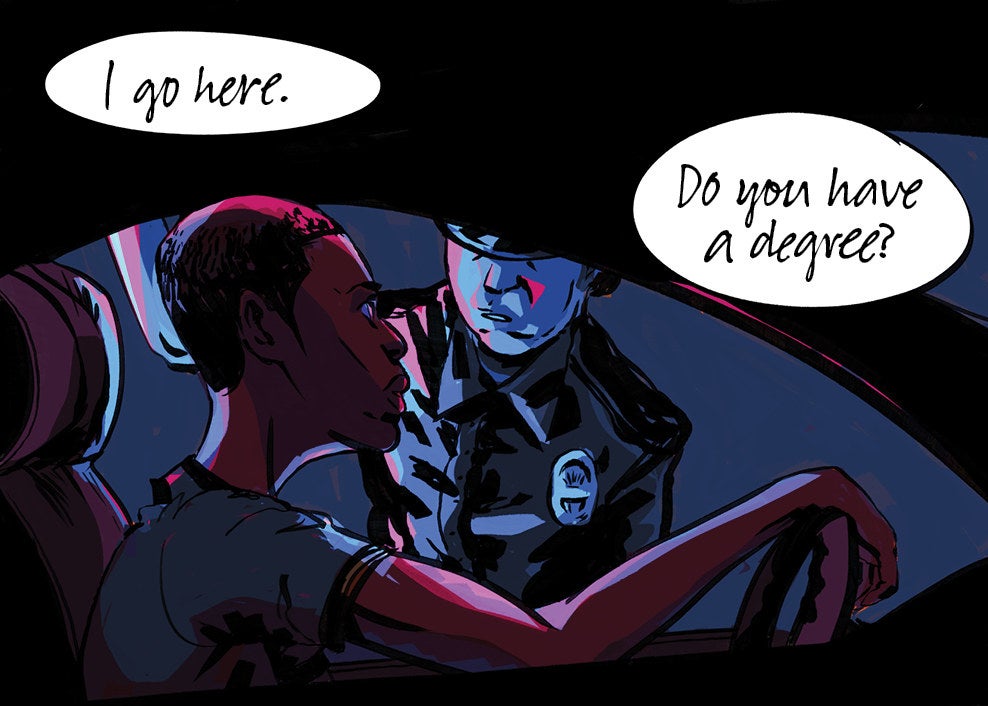
I’ve been learning how to drive every day of my life.
Once, nearly a decade ago, I got pulled over four blocks from my house. I was riding back from football practice with a friend, something my folks weren’t in the habit of letting me do. This friend was a good guy, and my parents had met him before, and they swore their unease hadn’t stemmed from distrust or suspicion — but my friend was black. I am, too. And we lived in this mostly white Texan town. Two black boys in a car will catch problems all over the world, but as far as my folks were concerned, geography wasn’t in our favor.
They let me go, though. I guess we thought, What could happen? And what happened was nothing, at least for most of the drive. We made it across the feeder road, under the highway, and past the gas station before we finally paused at a stoplight and I made eye contact with this cop.
He’d settled across the street. I remember him giving me a stare. I remember the face he made, like he was deep in thought.
I remember not thinking much of it. And the light had already turned. And we hadn’t done anything wrong. Maybe 30 seconds later, the siren popped off.
What the fuck, said my friend.
I told him I didn’t know. But when I saw the cop’s face, I did know. I’d figured it out. I didn’t know what I’d done, but I figured I’d done something.
The cop was white and stocky. He asked my friend for his license. And of course my friend hadn’t brought it, because he was a kid just driving home from school, and sometimes kids make mistakes.
But the cop looked between us. He crossed both of his arms.
Well, said the cop, maybe we should take a drive, then.
He trailed us to my friend’s house. I sat in the car. When my friend rang his doorbell, his mother didn’t answer. The cop stood behind him, hands on his hips, and my friend stood in front of him, ringing that fucking doorbell. He’d pressed it something like 40 times before his sister finally answered, and she looked at her brother, and then at the cop, and my friend disappeared inside.
It couldn’t have taken five minutes. It felt like 50 years. When my friend stepped out with the license, the cop didn’t even look at it. He just nodded, smiling.
He told my friend to keep it on him.
He called my friend "boy."
He drove off.
My friend and his sister just stood in the doorway, and after a while, I ended up walking back home. It was my first driving lesson — the first one that really mattered. I didn’t catch a ride with anyone else for months.

I didn’t know what I’d done, but I figured I’d done something.
Once, I got pulled over on the other side of town. It was many years later, in a rougher part of Houston. I’d been living there for a while, because the rent was cheap, and the people were nice, and sometimes bad shit happened but that’s the life we lived in.
It was the middle of the day. I’d just left a nearby taqueria. Halfway back to my place, I decided, Fuck it, and stopped by a park to eat my spoils. So when the two sirens whooped behind me, I tucked the aluminum under my seat, and I put my hands onto the wheel, and I watched the officers saunter over.
They knocked on my door. They asked me to step outside. One officer took his shades off, and the other one kept his on.
The first one said, "This him?"
The other cop looked at me. He squinted. I wasn’t sure who “he” was, but I didn’t think it was me. I tried to make a face that made this abundantly clear. I frowned, but that didn’t feel right, and then I smiled, but that didn’t feel right either. I didn’t know what not guilty looked like. I didn’t know why I needed to know that.
I ended up somewhere in between, wearing the smirk you’re stuck with in the middle of a tragedy.
The second cop made a similar face.
No, he said, although he didn’t sound so sure.
No, he said, again. Close. But I don’t think he’s ours. The ears are a little off.
So the cops told me to drive on. Neither of them apologized. They said to stay off the corners, the neighborhood wasn’t safe. They told me I should’ve known better. I got back into my car, and a packet of salsa burst under my ass.

I wasn’t sure who “he” was, but I didn’t think it was me.
Once, I got pulled over in another part of Houston. I’d driven to a party, at this bar by the university I attended, and I’d been looking for a spot in the school lot because there were four parking spaces for four thousand cars.
That’s when I noticed the cruiser behind me. The cop had been creeping for a few blocks by then. When she finally hit the siren, I put the car in park, because I already knew the drill. I’d finally gotten the message.
The officer asked for my license. She asked if I knew I’d driven onto campus property. I told her I was aware, and that I was actually a student.
Her expression said she didn’t know what to do with this information.
What, she said.
I go here, I said. I’m paying to stick around.
The officer made a face.
Do you have a degree? she asked.
And then she repeated the question, and I cocked my head, because it sounded like a trick. I told her I was working on it.
Sure, she said, but it came out like a question. She looked at the car, and then at me. I wondered if my tuition went into her salary.
She ran my plates. She ran my driver’s license. She verified my student ID, comparing the photos. She asked for my insurance, and if I was leasing the car, and where was I leasing it from, and she took the documents to her computer.
When she walked back to my car, she gave me a speech about driving at night. She riffed on the university’s parking policies. She told me I should’ve known better. In the time she’d taken to stop me, at least 10 cars had come and gone, but I didn’t say shit about it.

It sounded like a trick. I told her I was working on it.
A few weeks back, some white friends took me out drinking. We live in New Orleans; I needed a city that took me off the road. We’d made it well into the evening, past that part where the sky turns blue, when one guy took out his phone because he had a video to show me. We watched a young man, a student at Northwestern University, exit his car with his hands above his head. We watched him get tackled by one cop from the Evanston Police Department. We watched him get swarmed by another five, from offscreen, from all sides. We watched the video in silence, and the bar popped around us, and when it finally ended my friend asked if I thought that was crazy.
Of course it was crazy. Of course it was obviously, absolutely insane. Of course it took your breath away, it literally exhausted you, it made you wonder why you bothered to begin with. I could’ve told my friends about the time I’d been pulled over for having another brown guy in my car. I could’ve told them about the time I’d been pulled over for driving five miles under the speed limit. I could’ve told them about the time I’d been riding with friends — white, like them — stuffed in the backseat with four other bodies, moving 30 over the limit, and the cop looked in our car and his eyes skimmed over the (white) driver and he asked us if we were headed to the game and did we know the other team had already scored?
I could’ve told my friend in the bar that this video was another lesson. I could’ve told him that he couldn’t see it, that he wouldn’t ever, really, see it, but this lesson was the story of our lives. But I didn’t do that. I told him this story instead:
This winter, I got pulled over in Baton Rouge, Louisiana. Two months had passed since November’s election. I’d been using the drive to think. I’d made it past Beaumont, out of Texas, through Lafayette, all along the wetlands, and over some bridges and below them again; I thought about the people who lived there, and who they were, and what they believed, and who they’d cast their ballots for, and what they’d thought when they did that. Maybe a mile outside of the port, my tire popped at almost 80 miles an hour on the highway.
By the time the first cop showed up, I’d maneuvered my car to the side of the road. The officer asked if I had a spare. I told him I did not. He crossed his arms, shaking his head, and I wondered who he’d go home to. I wondered whether he’d mention this stop to them. I thought about how strange it was that he’d stopped to help. This, I thought, was evidence of something, even if I didn’t know what, and I’d started to thank him, could actually taste the words on my tongue, when the second patrol car screamed into the grass beside us.
And then another car pulled beside it. And then another one after that. Six men, from three vehicles. They all jumped out of their cars. A couple were plainclothes, and a couple were suited up, and I looked at them, and they looked at me, and all I could do was laugh.
A detective in a pink polo walked over to shake my hand. He told me they were looking for a guy with my profile. He asked how long I’d been in Baton Rouge. Less than 10 minutes beforehand, I’d been wondering if I’d survive the accident, but this man couldn’t have cared less. He looked at me in my sweatpants and sandals and asked if I had any ID.
The other five officers circled my shitty car. I watched them do it. I laughed, and I laughed. Drivers passed us by. I watched every single one, and I wondered how this panorama looked in their head. They’d all seen it before. They’d certainly see it again. At some point, terror slips wholly into the absurd.
Finally, one of the officers asked what I thought was so funny.
Everything, I said, and I waited for something to happen.
Nothing did. He only shrugged. And I knew it couldn’t help me, but I laughed when they ran my plates. I laughed when they wrote my number down. I laughed when they finally sent me off. And I laughed as the tow pulled me back to my city, when it dropped me by the house that I live in. I laughed not to cry, because it was one or the other, and because it had happened before, and because it will happen again. I laughed because here I was, watching history unfold, right before my eyes. ●
Bryan Washington is a writer from Houston. His first collection of stories, Lot, is forthcoming from Riverhead Books.
